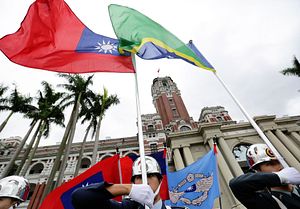Taiwan President Tsai Ing-wen is making a last-ditch effort to preserve one of Taiwan’s 17 remaining diplomatic allies, the Solomon Islands, which is reportedly on the verge of switching diplomatic recognition to Beijing.
Tsai hosted Solomon Islands foreign minister Jeremiah Manele in Taipei on Monday, just days after Reuters reported that the South Pacific country was on the verge of establishing ties with Beijing, citing the leader of a government team tasked with negotiating with Chinese officials.
In a parliamentary committee last week, Solomons lawmaker Peter Shanel Agovaka said that the country would switch to “a One China policy that recognizes only Beijing as the official government administration,” according to Reuters.
Reports in June indicated that the Solomon Islands intended to decide within 100 days on whether to retain ties with Taipei or to switch allegiance to Beijing. New Prime Minister Manasseh Sogavare, who took office in April, has pledged to find ways to improve the island nation’s economy.
Tsai touted the friendship between Taiwan and the Solomon Islands after meeting with Manele and a four-member Solomons delegation. She also pledged to promote further bilateral relations with the country, which has recognized Taiwan since 1983.
Solomons Deputy Foreign Minister Collin Beck told reporters in Taipei on Monday that its relations with Taiwan were “business as usual until a decision is taken.”
Beijing is reportedly offering a development fund to the Solomons to replace the annual $8.5 million contribution the country receives from Taipei.
Taiwan has lost five formal diplomatic allies since Tsai took office in 2016, leading to criticism from her opponents that her administration has not done enough to establish Taiwan’s international presence.
But Tsai’s administration has also strengthened the informal yet robust ties the country enjoys with larger nations – especially the United States, which has approved multiple arms sales to Taiwan since President Donald Trump took office in early 2017.
The South Pacific remains a diplomatic stronghold for Taipei, where it uses financial incentives to compete with Beijing for official recognition by island nations largely dependent on foreign aid.
Within Tsai’s Democratic Progressive Party, which favors the eventual independence of Taiwan, there is a sizable contingency reportedly unconcerned, if not intrigued, by the prospect of “diplomatic zero” – a situation in which no countries formally recognize the Republic of China as the government of China, thus freeing Taiwan to pursue diplomatic relations as a country and advance a party objective of moving away from the Republic of China framework.
Earlier this year, a contingency of Pacific Islands nations expressed interest in pursuing ties with both Taipei and Beijing simultaneously. No country maintains diplomatic relations with both Taipei and Beijing, and such a move would be fiercely opposed by China, which reiterated last week it was willing to have relations with any country that respects the “one China” principle.
Taiwan’s relations with its remaining diplomatic allies – most of which are holdovers from the island’s decades-long era of martial law – can make for awkward situations when the Taiwanese government, committed internationally to supporting human rights and democratic ideals, is made to show support to leaders in countries such as Nicaragua and eSwatini which are accused of human rights violations and have dubious, if nonexistent, commitments to democracy.
Should the Solomon Islands switch ties from Taipei to Beijing, its defection could be used as an attack line against Tsai by Kaohsiung mayor Han Kuo-yu, who is running against the incumbent in Taiwan’s January 2020 general election.
Taiwan’s state-funded Central News Agency reported on Tuesday that the people of Honiara, the capital of the Solomon Islands, largely supported their country’s ties with Taipei and expressed concern over Beijing’s economic influence in the country.
Taiwan and Solomons officials are continuing to discuss “a number of bilateral issues,” according to a spokesperson from Taiwan’s foreign ministry. But Manele declined to affirm ties between the Solomons and Taiwan, instead saying the country is conducting a broad review of its foreign policy and “reviewing all our overseas missions and relations.”
Beijing will likely be eager to coax the Solomon Islands to switch its recognition with the hope it could weaken Tsai’s position before January’s general election.
Other countries in the region have been speculated to be in play for Beijing. Tuvalu, which is set to choose a prime minister, could see the departure of its Taiwan-supporting incumbent. While Nauru’s former president, the Taipei-backing Baron Waqa, recently left office, Taipei on Monday accepted the credentials of Nauru’s new ambassador to Taiwan and pledged to explore new areas for cooperation between the two countries.

































